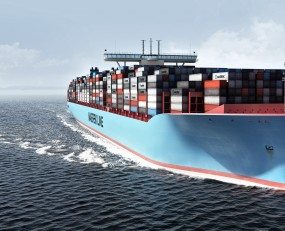
Maersk has announced record results for Q1 2022 across its businesses, driven by higher rates and strong long-term partnerships with customers seeking end-to-end supply chain support. Revenue was up 55% to $19.3bn, EBITDA more than doubled to $9.1bn and free cash flow increased to $6bn. The results follow up the creation of a new air cargo subsidiary.
The results reflect the best earnings quarter in the company’s history, with growth across Ocean, Logistics and Terminals. While global supply chains remain under significant pressure, it continues to demonstrate an ability to help customers overcome logistic challenges. In Logistics, it enjoyed strong demand for products and solutions across its portfolio, leading to the 5th quarter in a row with organic growth of more than 30%.
In Ocean, revenue increased by 64% to $15.6bn during Q1 as strong rates more than offset a 7% decline in volumes. Revenue for the full year is expected to continue to be strong as the increase in freight rates on its long-term contract portfolio will add what the company is hoping will be $10bn in revenue in 2022 compared to 2021. This is likely to offset the significant increase in costs, which were up 21% in the first quarter given higher fuel costs and inflationary pressure on network and container handling costs.
In Q1, revenue in Logistics grew 41% to $2.9bn compared to same quarter last year as both existing and new customers continue to buy into the full value proposition of integrated solutions. At the same time Maersk continues to invest in acquisitions that add capabilities within technology and e-commerce and strengthen the portfolio such as Pilot Freight Services, which closed on 2 May 2022.
In Terminals, revenue increased to $1.1bn in Q1 compared to $915m last year and the return on invested capital (ROIC) ended on a record 12.5% before impairment in GPI of $485m following the exit of the Russian market. The process around the sale of GPI is ongoing. Results in Terminals are driven by higher storage income in NAM, improvement in revenue per move and a volume growth in the overall contracting market.
Freight rates remained elevated in Q1 as Covid-19 and capacity shortages continued to disrupt the supply-side of the logistics industry. Global container demand declined by 1.2% compared to an 8% growth in 2021 while global air cargo volumes increased by 2.9%. Trade flow growth flattened from Far East to both North America and Europe. Russia’s invasion of Ukraine is having a negative impact on trade flows and consumer confidence in Europe. Given this background, global container demand is now expected to grow.
As announced on 26 April 2022, Maersk anticipates an underlying EBITDA of around $30bn, an underlying EBIT of around $24bn and a free cash flow above $19bn for the full year of 2022. This is based on a strong first half of 2022 as well as higher contracted rates, while the normalisation in Ocean is still assumed to take place early in the second half of the year.
Source: Maersk